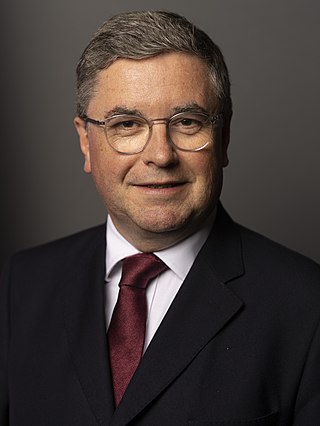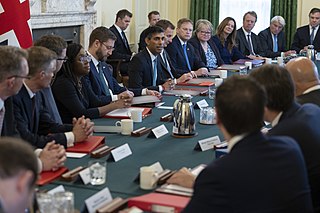
The House of Lords is the upper house of the Parliament of the United Kingdom. Like the lower house, the House of Commons, it meets in the Palace of Westminster in London, England. One of the oldest institutions in the world, its origins lie in the early 11th century and the emergence of bicameralism in the 13th century.

The Lord Chancellor, formally titled Lord High Chancellor of Great Britain, is the highest-ranking traditional minister among the Great Officers of State in Scotland and England in the United Kingdom, nominally outranking the prime minister. The lord chancellor is appointed by the sovereign on the advice of the prime minister. Prior to the union of England and Scotland into the Kingdom of Great Britain, there were separate lord chancellors for the Kingdom of England and the Kingdom of Scotland. There were Lord Chancellors of Ireland until 1922.
In the United Kingdom, life peers are appointed members of the peerage whose titles cannot be inherited, in contrast to hereditary peers. Life peers are appointed by the monarch on the advice of the prime minister. With the exception of the Dukedom of Edinburgh awarded for life to Prince Edward in 2023, all life peerages conferred since 2009 have been created under the Life Peerages Act 1958 with the rank of baron and entitle their holders to sit and vote in the House of Lords, presuming they meet qualifications such as age and citizenship. The legitimate children of a life peer appointed under the Life Peerages Act 1958 are entitled to style themselves with the prefix "The Honourable", although they cannot inherit the peerage itself. Prior to 2009, life peers of baronial rank could also be so created under the Appellate Jurisdiction Act 1876 for senior judges.

The Constitutional Reform Act 2005 is an Act of the Parliament of the United Kingdom, relevant to UK constitutional law. It provides for a Supreme Court of the United Kingdom to take over the previous appellate jurisdiction of the Law Lords as well as some powers of the Judicial Committee of the Privy Council, and removed the functions of Speaker of the House of Lords and Head of the Judiciary of England and Wales from the office of Lord Chancellor.

The Lord Speaker of the House of Lords is the presiding officer, chairman and highest authority of the House of Lords in the Parliament of the United Kingdom. The office is analogous to the Speaker of the House of Commons: the Lord Speaker is elected by the members of the House of Lords and is expected to be politically impartial.

The Ministry of Justice (MoJ) is a ministerial department of His Majesty's Government, headed by the Secretary of State for Justice and Lord Chancellor. Its stated priorities are to reduce re-offending and protect the public, to provide access to justice, to increase confidence in the justice system, and to uphold people's civil liberties. The Secretary of State is the minister responsible to Parliament for the judiciary, the court system, prisons, and probation in England and Wales, with some additional UK-wide responsibilities, e.g., the UK Supreme Court and judicial appointments by the Crown. The department is also responsible for areas of constitutional policy not transferred in 2010 to the Deputy Prime Minister, human rights law, and information rights law across the UK.

Janet Anne Royall, Baroness Royall of Blaisdon,, is a British Labour Co-operative Party politician. She was Leader of the House of Lords and Lord President of the Council. She is the principal of Somerville College, Oxford.

In the 1970s and 1980s, a large number of people – most of whom had haemophilia – were infected with hepatitis C and HIV, the virus that leads to acquired immune deficiency syndrome (AIDS), as a result of receiving contaminated clotting factor products. In England, these were supplied by NHS England. Many of the products were imported from the US.

Dominic Rennie Raab is a British Conservative Party politician who has been Member of Parliament (MP) for Esher and Walton since 2010. From 2019 to 2023, with a brief period out of office during the Truss premiership, Raab was deputy to prime ministers Boris Johnson and Rishi Sunak – as First Secretary of State until 2021 then as Deputy Prime Minister of the United Kingdom until 2023. Additionally he has served in the cabinet positions of Brexit Secretary, Foreign Secretary, Justice Secretary and Lord Chancellor.

Sir Robert James Buckland is a British politician who served as Lord Chancellor and Secretary of State for Justice from 2019 to 2021. He later served as Secretary of State for Wales from July to October 2022. A member of the Conservative Party, he has been Member of Parliament (MP) for South Swindon since 2010.

The Trade Act 2021 is an act of the Parliament of the United Kingdom to make provision about the implementation of international trade agreements. It was introduced to the House of Commons on 19 March 2020 by the Secretary of State for International Trade Liz Truss, and introduced to the House of Lords on 21 July 2020 by Lord Grimstone of Boscobel. It received royal assent on 29 April 2021.
A list of events relating to politics and government in the United Kingdom during 2022.

The Gender Recognition Reform (Scotland) Bill is a bill passed by the Scottish Parliament. The bill seeks to amend the Gender Recognition Act 2004 of the Parliament of the United Kingdom, making it simpler for people to change their legal gender. On 17 January 2023, the United Kingdom government used section 35 of the Scotland Act 1998 to block the bill from receiving royal assent, the first time section 35 has been used.

The Bill of Rights Bill was a proposed Act of Parliament in the United Kingdom that sought to replace the Human Rights Act 1998. It was introduced to the House of Commons by Dominic Raab, the Deputy Prime Minister of the United Kingdom and Secretary of State for Justice, on 22 June 2022.

The Sunak ministry began on 25 October 2022 when Rishi Sunak was invited by King Charles III to succeed Liz Truss as prime minister of the United Kingdom. Truss resigned as leader of the Conservative Party the previous day after Sunak was elected as her successor. The Sunak ministry was formed from the 2019 Parliament of the United Kingdom, as a Conservative majority government. Sunak has reshuffled his cabinet twice, first in February 2023 and later in November 2023.

Rishi Sunak's tenure as Prime Minister of the United Kingdom began on 25 October 2022 when he accepted an invitation from King Charles III to form a government, succeeding Liz Truss. He is the first British Indian to hold the office of prime minister. As prime minister, Sunak is also serving as First Lord of the Treasury, Minister for the Civil Service, and Minister for the Union.
A list of events relating to politics and government in the United Kingdom during 2023.

The Sentencing Act 2020 is a landmark Act of the Parliament of the United Kingdom. The Act has 14 Parts and 29 Schedules. Parts 2 to 13 of the Act together make up a code called the “Sentencing Code”. The Sentencing Code is the law which contains the main sentencing regime in England and Wales.












